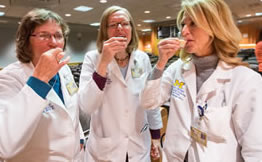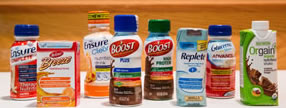Taste Test

Healthy eating during cancer treatment and the many varieties of nutritional supplements to try
Eating can be a major issue when you have cancer. Sometimes food doesn't taste good. Sometimes you're simply not hungry. And, sometimes food makes you feel even sicker than before you ate.
Registered dietitians at the U-M Rogel Cancer Center delivered a unique presentation to cancer care providers recently. In addition to offering valuable information on the importance of nutrition during cancer care, our dietitians let them taste for themselves the many different varieties of liquid nutritional supplements available to patients who don't feel much like eating.
"A lot of people eat because it tastes good and we obtain pleasure from it," says Danielle Karsies, M.S., R.D., a dietitian in the U-M Rogel Cancer Center Symptom Management and Supportive Care Program. "Different types of cancers have different nutritional-related complications and often eating might not be enjoyable. We aim to educate patients to think of nutrition like part of their treatment regimen, like medicine."
Common brand names of liquid nutritional supplements include Carnation Breakfast Essentials, Ensure, Boost, Replete, Breeze and more.

"I wanted to be able to provide recommendations to patients with their diets," says Elizabeth LaForge, BSN, a nurse in the urologic oncology clinic. "I learned today that you can freeze some of these supplements to taste better. Some are more like juice and not milk-based. There are a lot of options."
Some of the commonly asked nutrition questions by cancer patients are:
- What do I do when I have no appetite?
Read The New Dinnertime Battle for tips. - What do I do when food makes me nauseous?
The article, Keeping Nausea at Bay, explains how medication, diet and natural preparations can help curb queasiness - Does sugar feed cancer?
The American Cancer Society offers answers in: Nutrition and Physical Activity During and After Cancer Treatment: Answers to Common Questions - Is organic better?
Organic Curiosity offers information on why the answer to that question is "sometimes".
Karsies explained that patients with questions can ask their physician for a referral to see a dietitian. Patients with at least two of the symptoms below should be referred:
- Unintentional weight loss
- Eating less than 75 percent of your usual intake
- Significant nutrition-related side effects (like mouth sores or swallowing problems)
- Non-healing wound
To make an appointment for nutritional counseling, call 877-907-0859.
Continue reading the Summer, 2014 issue of Thrive.
